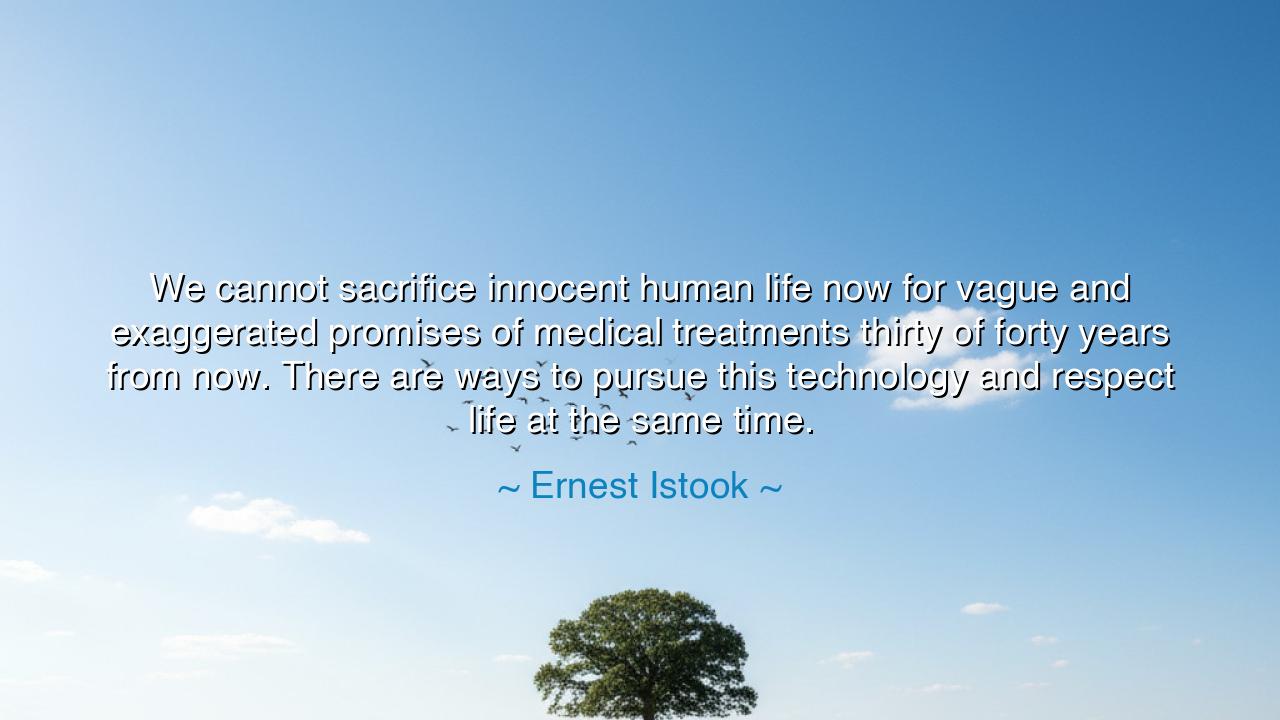
We cannot sacrifice innocent human life now for vague and
We cannot sacrifice innocent human life now for vague and exaggerated promises of medical treatments thirty of forty years from now. There are ways to pursue this technology and respect life at the same time.






Hearken to the words of Ernest Istook, a voice calling from the crossroads of morality and innovation, where the lure of progress tempts humanity to tread on the sacred ground of life itself. He warns that we cannot sacrifice innocent human life for promises that shimmer on the horizon, distant and uncertain—medical treatments thirty or forty years from now. In this admonition lies a timeless truth: that the pursuit of knowledge or advancement must never come at the expense of what is most precious and irreplaceable, the life of the innocent, whose worth is immediate and absolute.
Since the dawn of civilization, humans have faced similar dilemmas. The ancient Greeks debated the ethics of experimentation and inquiry, weighing the thirst for knowledge against the sanctity of human life. In the gardens of Alexandria, scholars amassed knowledge, yet wisdom cautioned them that the ends do not always justify the means. Istook’s words echo this ancient lesson: the pursuit of future benefit, however alluring, cannot excuse the compromise of present morality. It is a call to temper ambition with conscience.
Consider the haunting history of the 20th century, when medical experimentation on the powerless—on prisoners, the poor, the marginalized—was justified in the name of future cures. The atrocities committed, whether in Nazi Germany or in the Tuskegee syphilis study, illustrate the peril Istook warns against: the promise of advancement does not sanctify the means. Here, the value of human life stands unassailable, and history reminds us that innovation achieved through the sacrifice of innocents leaves a legacy of shame and sorrow, not triumph.
Yet, Istook does not condemn progress; he illuminates a path forward: “There are ways to pursue this technology and respect life at the same time.” This is the wisdom of the ancients, who sought harmony between human endeavor and ethical restraint. Just as the architects of Rome built mighty aqueducts without endangering the citizens who dwelt below, so too can modern science advance while safeguarding the sanctity of life. Innovation need not demand immorality; it must be guided by the enduring principle that every human being is sacred.
This principle finds resonance in the story of Jonas Salk, who developed the polio vaccine. Salk famously refused to patent his discovery, declaring, “Could you patent the sun?” He pursued a technology that would save countless lives without exploiting or harming anyone, embodying the ideal Istook articulates: advancement through respect, not through sacrifice. Such examples remind us that it is possible to achieve greatness without transgressing ethical boundaries, a truth that the morally awake have recognized throughout history.
Istook’s caution extends beyond medicine into every domain of human ambition. When wealth, power, or knowledge beckon, the temptation to bypass conscience for future promise is ever-present. Yet, as he affirms, humanity’s measure is not taken in potential benefits alone, but in how we honor the innocent and protect life in the present. Each generation is tasked with safeguarding the sacred while exploring the unknown, blending courage with restraint, ambition with reverence.
From this teaching emerges a practical wisdom: engage in innovation with vigilance and morality. Seek methods that protect life, invest in ethical research, and scrutinize promises of future gain against the cost to present integrity. Let policies, laws, and personal choices reflect the conviction that no advancement justifies sacrificing the innocent, and that true greatness arises from progress pursued with conscience and compassion.
So heed this counsel: let ambition be tempered by ethics, progress guided by respect, and the drive for discovery aligned with reverence for human life. In every decision, remember that the future is built not on the suffering of the defenseless, but on the courage to innovate without compromise of morality. In this balance lies the enduring legacy of a civilization that treasures life as sacred, even as it reaches toward the heavens of knowledge and understanding.






AAdministratorAdministrator
Welcome, honored guests. Please leave a comment, we will respond soon